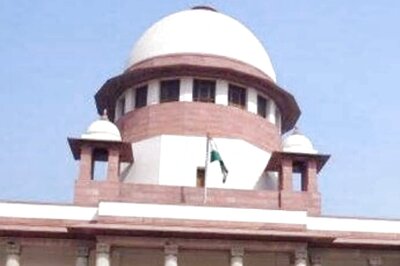
views
New Delhi: If you're living in small-town UP (or for that matter, small-town anywhere in India), what is your experience of getting any government document from the local body? Let's say, a birth/death certificate, or applying for old-age pension? In a typical case, you may have to stand in a long queue to get the appropriate form, often after paying a fee for it, even though such basic government forms are supposed to be freely available. Then you need another queue to submit the form, which also often involves greasing palms of the peons or junior clerks. If you succeed in getting your papers through, there is no way to know how long (or how expensive) getting that work done is going to be.
For millions of poors and illiterates in India who don't know their rights or laws, getting anything done in a government office can be a harrowing experience. Not in Ashrafpur Kichauchha area in Ambedkar Nagar district of UP, thanks to the the humble yet revolutionary initiative of a government officer, Alok Kumar Singh. Singh, serving as an Executive Officer at the Ashrafpur Kichauchha area in Ambedkar Nagar district, has created a website (http://npakmakdoom.com/) that has provided the kind of transparency to its citizens that even some of the best government websites fail to do.
So, if you're a resident of Ashrafpur Kichauchha, all you have to do is to log on to Singh's website, go to the relevant section and print out the form in the comfort of an internet cafe for a nominal charge. You can also read about the relevant laws and rules on the site in Hindi while you are at it. Once you are properly informed of your rights, fee etc, you can submit the form at the local office without any fear of being harassed. Once it is submitted, you can track the progress of your application on the site again.
Singh's website, with details both in Hindi and English, was created in 2008 - much before transparency became a buzzword in the spirited urban discussions triggered by movements like Team Anna's. Though the website looks uncannily similar to the government websites, it goes the extra mile in ensuring that those living in Ashrafpur Kichauchha area are able to access every piece of information that they need from their local body. "We aim to achieve perfection in everything that we undertake and we have a commitment to excel. It is the determination - to transform every challenge into opportunity - to seize every opportunity and ensure growth - to grow with a human face... that the... Nagar Ashrafpur Kichocha (sic)," the site declares as its driving motto.
That Alok Kumar Singh has indeed seized an opportunity and provided a human face - albeit to a local government body - is evident from the plethora of information that his site contains. From birth and death records, details of licences issued by the civic body, building plans, to all the official files and even the payments that citizens make to the local body are all listed on the site. It also shows the laws and acts passed by the government on local governance matters. It basically means that citizens in that town can not only access government records, but also access, print and even track their applications and files.
Singh's website also has a special section on the town's famous 600-year-old dargah of Sufi saint Hazrat Makhdoom Shah Ashrafi. One of the most famous shrines in UP, the dargah is visited by thousands of people all round the year. The site even gives information on the trains crossing the local railway station. Its comprehensive 'Citizen's Responsibilities' section is a primer on social and community behaviour.
According to a story published in The Indian Express on Thursday, Singh's unofficial website is not recognised by the government, although the local administration has taken a positive note of it. The report also says the website is being managed with meagre resources and efforts are on to arrange official funding for it. Corruption, India's biggest menace, can only be checked with more transparency. It is the determined officers like Alok Kumar Singh, who, by pushing the envelope even in marginal areas with limited resources or funding, can ensure real democracy by ensuring transparency, and therefore, a more active and informed public participation in government matters.


















Comments
0 comment